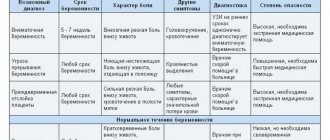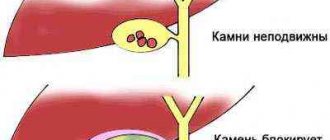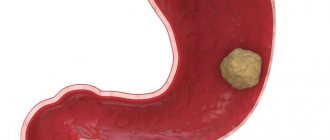Causes of burning in the groin area
A burning sensation in the groin in men occurs both for harmless reasons and due to serious pathologies of the genital organs and other body systems. Most often, burning in the perineum in men occurs due to poor hygiene. To get rid of this unpleasant symptom, it is enough to keep your body clean and change your underwear regularly.
If a burning sensation in the lower abdomen occurs due to sexually transmitted infections, then the treatment is quite long. Correct diagnosis and research are of considerable importance.
Sometimes the cause of the pathology lies in an allergic reaction to powder, gels and lotions. In this case, you need to avoid contact with the allergen and take an antihistamine. Below we will look at the main diseases and conditions that cause burning in the groin area in men.
Candidiasis
Often a burning sensation in the perineum and groin is associated with a fungal infection. The fungus is activated against a background of weakened immunity, diabetes mellitus, and excessive sweating. A constant, moist, warm environment in this area is favorable for this microorganism, so for recovery it is important to wear loose cotton underwear and regularly wash and dry the area well.
Associated symptoms of pathology:
- itching and burning;
- swelling of the foreskin and penis;
- there is a characteristic sour smell;
- whitish or grayish coating on the head of the organ;
- characteristic cheesy discharge from the urethra.
Dermatomycosis
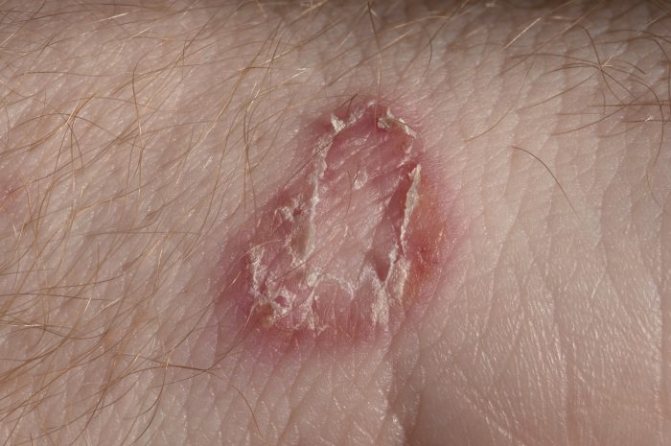
If a man feels a burning sensation in the groin, then it may be dermatomycosis. In this case, pathogenic fungi infect the skin in this area. Since the fungus loves warmth and humidity, wearing tight underwear, constant moisture in the skin folds, and microtrauma in the groin area contribute to the appearance of the disease.
- local redness of the skin;
- severe itching;
- Blistering rashes appear on the scrotum, groin, and thighs (but the rash does not appear on the penis).
Herpes
If there is a burning sensation in the groin in men, the causes may be associated with genital herpes. Infection occurs from a sick sexual partner or a hidden carrier. A predisposing factor to the appearance of genital herpes is reduced immunity.
Clinical picture of the disease:
- severe itching and tingling in the groin area;
- general malaise (fever, headache, weakness and nausea);
- swelling of soft tissues;
- bubble rashes with transparent contents;
- after opening the blisters, dry crusts or sores form;
- with ulcers on the genitals, a man will feel pain when urinating.
Allergic reaction
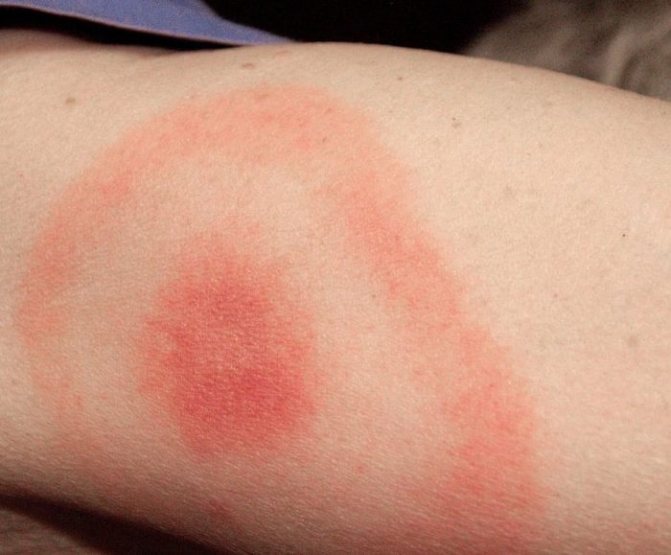
Often the cause of burning and itching in the groin is an allergy. Typically, the pathology is manifested by irritation, burning, itching, swelling and rashes in this area. Typically, an allergic reaction takes the form of urticaria or dermatitis.
The cause of the pathology can be food products, hygiene products (lotions, soaps, gels), medications (local or systemic), and synthetic underwear materials.
Chlamydia
The causative agent of this STD is chlamydia. The disease sometimes does not manifest itself at all and is discovered by chance during an examination for another reason. Some men have the following characteristic symptoms:
- irritation of the head of the organ;
- itching;
- pain during urination and sex;
- slight clear discharge from the urethra.
Scabies
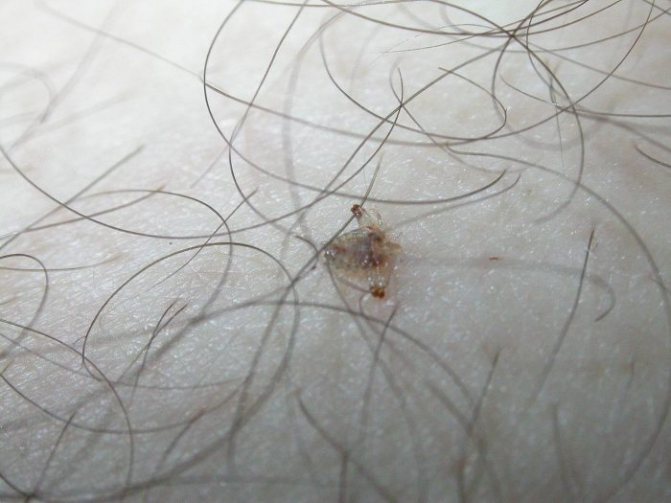
The scabies mite in the groin area causes irritation and itching at night when the parasite makes passages in the epidermis. The first symptoms can be noticed between the fingers, only then the disease spreads to the groin folds.
Characteristic symptoms are rashes in the area of affected tissues, scratching followed by the formation of crusts, and severe itching. Sometimes the passages made by the tick in the skin are noticeable.
Ureaplasmosis
Inflammation of the genitourinary system caused by ureaplasma is characterized by the following symptoms:
- scanty transparent discharge from the urethra;
- pain when emptying the bladder;
- burning sensation in the penis area.
Diabetes
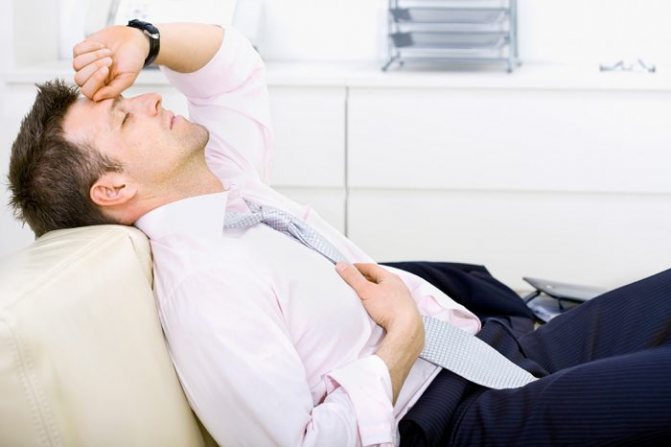
The fact that itching that occurs in the groin area is a consequence of diabetes can be judged by the presence of the following symptoms:
- drowsiness;
- general weakness;
- frequent release of urine in large quantities;
- constant thirst;
- unpleasant odor in the groin folds, elbow bends, under the knees and between the buttocks.
Other causes of burning
Often, burning is a secondary symptom of the following pathologies:
- Kidney pathologies contribute to an increase in nitrogen in the blood. As a result, sweat irritates the skin. Since there are many sweat glands in the groin, irritation and sensitivity of the skin in this area occurs.
- Pathologies of the pancreas and liver lead to the appearance of jaundice, which causes severe itching of the skin.
- Endocrine pathologies (especially problems with the thyroid gland).
- HIV. At the terminal stage of this disease, the immune system is completely destroyed. The process is accompanied by itching, rashes, redness and the formation of ulcers in the groin.
- Worm infestations and weakened immunity can also cause pathology.
Cramping and burning in the lower abdomen in men - causes and why it is dangerous
Often men experience burning and cramping in the lower abdomen. In order to find out what caused their appearance, you need to seek professional help from a doctor who, after carrying out the necessary diagnostic measures, can make the correct diagnosis and prescribe the necessary treatment.
Burning and cramping in the lower abdomen in males may be the first signs of infectious diseases, sexually transmitted diseases, as well as inflammatory processes in the prostate gland or bladder.
Representatives of the stronger half of the planet very often delay a visit to a specialist, as they are embarrassed by the intimate problems that have arisen. They often self-medicate and resort to traditional methods of treatment, which leads to aggravation of the situation; the disease often becomes chronic and leaves its mark on a man’s life in the form of various undesirable complications and consequences.
Reasons and what it could be
Burning and cramping in the lower abdomen can be harbingers of various diseases, the main ones include:
- Sexually transmitted diseases such as chlamydia, syphilis, gonorrhea. Their first symptoms often appear within 48 hours after infection. Sexually transmitted diseases are also characterized by skin rashes in the intimate area, problems with urination and pain during this process; patients often experience pain and discomfort during sexual intercourse with a woman. If you discover the above symptoms, you should consult a urologist. Venereal diseases require immediate professional treatment. Traditional methods are aimed only at reducing symptoms, but cannot rid the body of the true causes of the disease.
- Inflammation of the prostate gland occurs for various reasons, it can be a previous sexually transmitted disease, hypothermia, genetic predisposition, weak immune system, excessive stress, and so on. In this case, representatives of the stronger sex, in addition to burning and stinging, experience a lot of other unpleasant symptoms, for example: they experience a feeling of discomfort during sexual intercourse, they have problems with erection, patients are characterized by a frequent urge to urinate, which is often accompanied by pain . Prostatitis most often occurs in mature men.
- Diseases associated with the reproductive system , such diseases, for example, include vesiculitis, which is an inflammation of the seminal vesicles. In this case, the production of seminal fluid is disrupted, and the man experiences severe pain in the lower abdomen, which intensifies during sexual intercourse. If left untreated, the disease can lead to the formation of an abscess of the seminal vesicle and further treatment with surgical intervention, including amputation. Orchitis is an inflammatory process in the testicles, in this case the pain radiates to the sacrum and lower back.
- Cystitis is an inflammation of the bladder. Men are much less susceptible to the disease than women. This is due to the peculiarities of the anatomical structure. The urethra of the stronger sex is much longer, so pathogenic microorganisms have problems getting into the bladder. The disease is also characterized by an increase in temperature, the color and smell of urine changes, and patients experience the urge to urinate every 20-30 minutes.
- Venereal diseases are dangerous because in some cases they can lead to infertility and impotence.
- Prostatitis can develop into a chronic form, and patients also have an increased risk of developing cancer affecting the prostate gland.
- Diseases associated with reproductive function, if not properly treated, can lead to impotence and infertility.
- Cystitis can develop into enuresis (bedwetting) and pyelonephritis.
Why is this dangerous?
If you experience pain and a burning sensation in the lower abdomen, you must consult a doctor and start treatment on time, otherwise there is a possibility of complications that depend on the type of disease that caused these symptoms:
Diagnostics
In order to make a correct diagnosis, the doctor must first collect an anamnesis. The specialist asks the patient about symptoms, recent sexual contacts with unfamiliar partners and without a condom. Next, the doctor, if necessary, prescribes further diagnostics, which may include:
- General blood analysis.
- Ultrasound examination of the prostate and abdominal organs.
- Analysis of urine.
- CT scan.
- Magnetic resonance imaging.
What to do?
If pain or burning occurs in the lower abdomen, it is recommended to immediately consult a doctor who can make the correct diagnosis and prescribe treatment. It is strictly forbidden to self-medicate and resort to traditional methods of therapy without first consulting with your doctor. During the therapeutic course you should:
By following all these rules, you can avoid the occurrence of pathology.
Loading…
Source: https://KardioBit.ru/pochki/rezi-i-zhzhenie-vnizu-zhivota-u-muzhchin-prichiny-i-chem-eto-opasno
Etiology
Clinicians know many causes of pain in the lower abdomen: all causes are divided into several categories.
The first is represented by diseases that negatively affect the gastrointestinal tract:
- intestinal obstruction;
- inguinal hernias;
- Crohn's disease;
- nonspecific ulcerative colitis;
- oncological or benign tumors of the gastrointestinal tract, in particular in the large intestine;
- irritable bowel syndrome;
- acute inflammation of the cecal appendage;
- diverticulosis and intestinal dysbiosis;
- chronic constipation;
- sigmoiditis;
- polyposis;
- gastritis of any nature;
- gastroduodenitis;
- ileitis;
- inflammatory process in the pancreas;
- ulcerative lesion of the stomach.
Stomach ulcer in men
The second most common cause is pathological causes involving the genitourinary system. In such situations, the occurrence of pain is provoked by the following factors:
- inflammation of the prostate gland;
- priapism - acute pain in the lower abdomen caused by prolonged erection;
- adenoma and prostate cancer;
- pyelonephritis and cystitis;
- an inflammatory process in the testicles, which is medically known as orchitis;
- renal colic caused by urolithiasis;
- inflammatory lesion of the penis;
- vesiculitis and epididymitis;
- urethritis;
- cavernitis and colliculitis;
- inflammatory or oncological lesions of the bladder;
- balanitis and fasting;
- varicocele or testicular hydrocele;
- testicular torsion.
Less common predisposing factors that cause lower abdominal pain in men include:
- disruption of the functioning of the endocrine system (adrenal glands, pituitary gland and thyroid gland);
- cystitis;
- radiculitis;
- STD;
- kidney disease;
- infarction or volvulus of the spleen;
- intervertebral disc herniation.
Cutting pain, in addition to the indicated pathological provocateurs, can be caused by the prolonged influence of such physiological sources:
- lack of physical activity;
- addiction to bad habits, for example, drinking alcoholic beverages in large quantities;
- hypothermia of the body;
- lack of diet;
- presence of obesity;
- interrupted sexual intercourse;
- hormonal imbalance;
- failure of the immune system.
Symptoms
Regardless of the cause of pain in the lower abdomen in a man, discomfort always acts as the first, but not the only clinical manifestation.
The symptomatic picture may include a large number of signs characteristic of the underlying disease, which is why the complaints of each patient will be strictly individual.
There is a group of symptoms that develop most often.
Additional clinical manifestations:
- bloating;
- increased gas formation;
- frequent urge to urinate - some may be false;
- nausea ending in vomiting - vomiting does not always bring relief;
- temperature increase;
- fluctuations in blood tone indicators;
- disruption of the bowel movement process - constipation and diarrhea, their alternation;
- the presence of pathological impurities in feces, urine and vomit;
- premature ejaculation;
- erectile disfunction;
- decreased physical activity and mental performance;
- aversion to food;
- irritability and weakness;
- tendency to depression;
- itching and burning in the anal area;
- irradiation of pain - more often the pain spreads to the lower limbs, scrotum and groin area, the entire anterior wall of the abdominal cavity and lower back;
- profuse sweating;
- headaches and dizziness;
- causeless weight loss;
- pain when urinating;
- decreased duration of sexual intercourse;
- chills and belching;
- discharge from the urethra;
- heartburn and hiccups;
- pale skin;
- infertility.
The main symptom can be either constant or periodic. Increased pain is most often observed at night, during or after eating food, during sexual intercourse and visiting the toilet.
All external signs that may be accompanied by aching pain in the lower abdomen should be attributed to males of any age category.
Other reasons
Pain in the groin area can also be caused by:
- Inguinal hernia. In this disease, due to a defect in the abdominal muscles, a section of the intestine prolapses into the inguinal canal in the form of a pouch-shaped diverticulum (loop). In men, the symptoms of an inguinal hernia are nagging pain at the site of diverticulum formation. Upon examination, the hernial protrusion can be seen; it increases with the vertical position of the body.
Important! If the hernia is large, it may become strangulated, and the pain syndrome increases sharply. The blood supply to the pinched area of the intestine is disrupted, and its tissues may become necrotic, which can lead to the development of peritonitis. In such a situation, emergency surgery is indicated.
- Appendicitis. All known signs of inflammation of the appendix are attacks of colic that cover the right side of the groin. They can radiate to the leg or perineum; palpation reveals tension in the peritoneal muscles. An acute attack of appendicitis is often accompanied by nausea, stool retention, and low-grade fever.
- Tumors in the pelvic area. The phenomenon of synalgia, when pain radiates to other areas of the body, in particular the groin and perineum, is typical for most neoplasms localized in the pelvic area. The source of the pain signal in such cases is identified during examination using laboratory and instrumental methods.
- Varicose veins Pain in the groin can be caused by pathologies of the valves of the veins located in the perineum. In particular, this is how varicocele manifests itself - varicose veins of the vessels of the spermatic cord.
- Injuries . When the muscles or tendons of the groin are damaged, pain usually occurs when moving. There may also be slight inflammation or swelling of the soft tissue.
- Pathologies of the musculoskeletal system. People with diseases of the skeletal system often complain of discomfort in the groin. With osteochondrosis, arthritis or coxarthrosis, compression of the nerve fibers occurs, some of which extend to the lower edge of the peritoneum.
- Inflammation of the lymph nodes. Enlarged lymph nodes located in this area can cause pain in the lower abdomen. Catarrhal phenomena in the lymph nodes can develop due to diseases of the internal organs, as well as as a result of infection or injury.
Treatment
The tactics of neutralizing pain syndrome are conservative. Treatment of discomfort involves taking medications:
- antibacterial substances - in cases of any inflammatory process;
- analgesics and antispasmodics;
- non-steroidal anti-inflammatory drugs;
- immunomodulators;
- prebiotics and probiotics;
- mineral and vitamin complexes.
Severe pain in the lower abdomen in men can be eliminated using physiotherapeutic procedures:
- ultrasound;
- medicinal electrophoresis;
- warming up;
- acupuncture;
- magnetic therapy;
- diadynamic therapy;
- darsonvalization;
- inductothermy;
- UHF.
Conservative treatment may include:
- diet therapy - a gentle menu is compiled only by the attending physician;
- massotherapy;
- folk remedies - used only after consultation with a clinician;
- Exercise therapy.
All methods will help relieve pain, but do not affect the treatment of the underlying disease. To eliminate the disease that caused the pain, both conservative methods and surgical intervention may be required.
If stabbing pain appears in the lower abdomen in men, indications for surgery are:
- testicular torsion;
- neoplasms of any nature;
- appendicitis;
- varicocele;
- cholelithiasis.
Prevention and prognosis
To avoid pain in the lower abdomen in men, you just need to follow general simple preventive rules:
Source: https://sakhbmc.ru/simptomy/rezi-vnizu-zhivota-u-muzhchin.html
Diagnosis of diseases
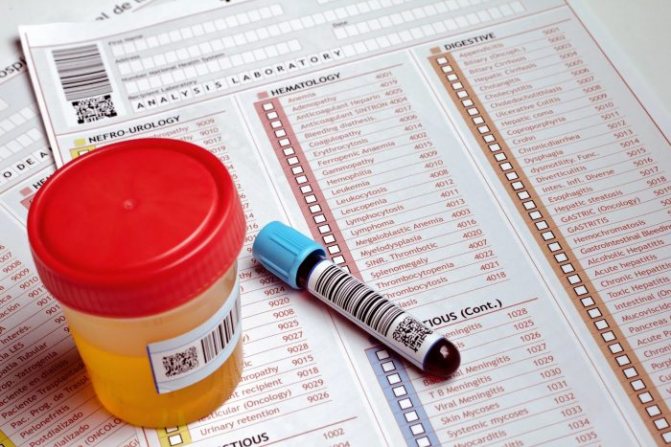
If a burning sensation occurs in the intimate area in men, then it is necessary to pay attention to the accompanying symptoms, which will facilitate the diagnosis of the pathology. Thus, burning is often accompanied by the following symptoms:
- hyperemia of the skin (the skin turns red due to inflammation or scratching);
- Often, rashes appear in the intimate area in the form of bright red dots (this is either a rash that accompanies infectious diseases, or hemorrhages due to mechanical stress);
- severe itching in the groin area;
- cracks on the surface of the skin and ulcers (usually they appear as a result of long-term untreated irritation and inflammation);
- decreased performance, poor sleep and irritability often arise due to the constant discomfort that a man feels;
- discharge from the urethra.
Which doctor should I contact?
First of all, a man should consult a dermatologist, since pathology is often associated with damage to the skin. Once the cause is identified and after a thorough examination, treatment is prescribed.
If the burning sensation in the groin area is associated with sexually transmitted infections, then you will need to consult a venereologist. Renal pathologies that cause secondary burning of the skin are treated by a urologist, and gastrointestinal diseases fall under the purview of a gastroenterologist.
The appearance of pain or severe discomfort in the lower abdominal region in a man is an indicator of the development of a disease or inflammatory process. Pain is just a symptom that indicates the presence of pathology, but is never an independent disease.
Therefore, when the first symptoms appear, you need to determine the cause and seek medical help. Timely differential diagnosis and correctly prescribed therapy are the key to quality treatment and preservation of health.
The main reasons why pain in the lower abdomen in men
The most common causes of pain in the lower abdomen in men are dysbiosis, bloating, constipation, and physical damage. Pain can also appear with the development of one or more pathologies and can be localized in different parts of the abdomen.
Pain in the left lobe
There are many reasons why severe pain in the left side may occur, but a number of main ones stand out:
- gastritis or gastroduodenitis;
- acute enlargement of the spleen;
- splenic infarction;
- spleen abscess;
- volvulus of the spleen;
- chronic myelo- and lymphocytic leukemia;
- Crohn's disease;
- polyposis;
- atypical location of the inflamed appendix;
- diverticulitis;
- sigmoiditis;
- diverticulosis of the sigmoid colon;
- irritable bowel syndrome;
- sigmoid colon cancer;
- urolithiasis disease;
- intestinal obstruction.
Pain in the right lobe
In most cases, pain on the lower right side of the abdomen indicates appendicitis, but a number of problems are also possible, such as:
- inflammation of the right kidney or ureter;
- appendicitis;
- Crohn's disease;
- nonspecific ulcerative colitis, in the progression stage;
- diverticulitis;
- diseases of the spine;
- ileitis.
Pain in the groin area
Pain in the lower abdomen, radiating to the groin area in men, most often occurs in the presence of the following diseases:
- acute prostatitis and exacerbation of chronic prostatitis;
- cystitis;
- bladder cancer;
- prostate cancer;
- hemorrhoids
- hernia
- vesiculitis.
Chronic pelvic pain syndrome is an unpleasant and quite common condition in men, when a feeling of heaviness, discomfort, and fullness is present in the lower abdomen and affects all areas of a man’s life: his potency, ability to enjoy life and express positivity in the value system.
Causes of frequent urination in men
Have you been trying to cure your KIDNEYS for many years?
Head of the Institute of Nephrology: “You will be amazed at how easy it is to heal your kidneys just by taking it every day...
Read more "
Frequent urination in men can be a serious cause for concern. Night urges at short intervals are especially alarming. And if they cause pain, then the man should immediately consult a doctor so that he can prescribe the necessary treatment.
Frequent urges are often normal. This happens when a man drinks a lot of fluid, and the amount of urine excreted corresponds to this volume. But if urine comes out in small portions, causing pain, itching or burning, then there are abnormalities in the body that need to be treated.
Causes of frequent urination
There are a number of diseases in which this problem is one of their main symptoms. Frequent urination in men is caused by:
- BPH;
- Prostatitis;
- Urethritis;
- Cystitis and pyelonephritis;
- Urolithiasis disease.
BPH
Prostate adenoma is a common cause of frequent urination in men. When the tumor grows, it blocks the lumen of the urethra, which provokes the urge even at night. In this case, the volume of fluid released is significantly less than the contents in the bladder. Since it is not completely emptied, the man wants to go to the toilet again and again. At the first stage of the disease, in the absence of a clear clinical picture, conservative treatment of the adenoma is carried out. But if the tumor grows rapidly, they resort to surgery. If you experience frequent urination at night, consult a doctor immediately. The sooner the cause is identified, the easier it will be to treat.
Prostatitis
Frequent urges at night can be a sign of prostatitis. This disease affects both the urethra and the bladder neck itself. At the same time, the man constantly wants to go to the toilet, but does not empty himself completely. Urination during prostatitis causes burning and cutting pain in the groin. If the doctor has diagnosed you with this and prescribed treatment with antibiotics, do not neglect his recommendations. You need to take the tablets according to the schedule, without missing a single dose. Only in this case is it possible to forget about frequent urination, the cause of which is prostatitis. Sometimes this disease is treated with laser therapy, ultrasound and ozone therapy.
Urethritis
Often, in men who experience frequent urges day and night, the doctor detects inflammation of the urethra. This is an infectious disease that occurs when pathogenic substances from the environment enter the canal. The reason for this is non-compliance with personal hygiene rules. Only after the doctor examines the man’s test results can he prescribe proper treatment for urethritis. Most often it is carried out with the help of antibiotics of various types. When treating the disease, liver test results must be taken into account.
Cystitis and pyelonephritis
Frequent urination in men is a common symptom of these diseases. And although cystitis is rare among representatives of the stronger sex, for some of them it causes extremely unpleasant sensations. Inflammation of the bladder is characterized by:
- pain when going to the toilet;
- cramping in the lower abdomen at night;
- constant urges.
Also no less dangerous and unpleasant is inflammation of the kidneys (pyelonephritis). Added to the above symptoms are nagging pain in the lower back, which intensifies with movement. To get rid of these diseases, you need to consult a doctor in a timely manner and begin treatment. It is based on the use of antibiotics and diuretics. The patient is also recommended to drink plenty of fluids and apply warming pads to problem areas. It is not recommended to treat cystitis and pyelonephritis on your own. The wrong medicine can harm other body systems.
Urolithiasis disease
An increased desire to go to the toilet may be caused by the presence of stones in the kidneys or ureter. In addition, they cause excruciating pain and girdle pain. It can be so strong that it often leads to vomiting. There are two ways to treat urolithiasis. In the first case, the stones are removed through surgery. In the second, they are eliminated naturally under the influence of special drugs. This is done only when their size is not very large.
The causes of frequent urination in men are quite different, so you should not try to treat it yourself. You can ignore night urges only if they are explained by drinking too much, taking diuretics, or eating foods with a high liquid content.
Symptoms of diseases of the lower abdomen
To find out which doctor to contact for medical help, it is necessary to determine all tangible deviations in the body’s functioning and the presence of discomfort in the area where the organs are located.
As a result of such anamnesis collection, 90% of the causes of this symptom can be determined. But such diagnostics are prohibited in case of acute and prolonged pain, and you should immediately call an ambulance or go to the surgical department of the Central District Hospital.
In order to conduct a quick self-diagnosis, you just need to compare the pain and symptoms with the following diseases:
- Constipation and bloating . In most cases, constipation and bloating occur when the upper intestines are disrupted or when heavy and poorly digestible foods are consumed. Colic and spasms appear, which occur when the walls expand with gases and feces.
- Dysbacteriosis . It develops as an independent disease or as a result of taking antibiotics. Fungi, pathogenic and conditionally pathogenic microorganisms irritate the intestinal walls, thereby causing colic and discomfort in the lower abdomen in men. Depending on the type of microorganism and health status, symptoms increase over several days.
- Worm infestation . Painful sensations appear after irritation of the mucous membrane by worms. Depending on the type of parasite, the pain can be bursting, acute, short-term or long-lasting with spread throughout the intestine.
- Damage . The causes of pain can be injuries and acute pathologies of internal organs, subsequently developing violations of the integrity of their structures. As a result, acute, prolonged pain or periodic attacks appear with increasing intensity and strength of sensations.
- Peritonitis . Subsequently, a violation of the integrity of the structures of hollow internal organs and the outpouring of foreign contents into the abdominal cavity develop. The disease begins acutely with an increase in symptoms. Depending on the location of the damage and the nature of the contents, the first signs can appear anywhere in the intestine and spread quickly.
- Neuritis of the sciatic nerve . It is characterized by the development of an inflammatory process of the sciatic nerve as a result of intervertebral compression or traumatic damage to the structure of the nerve fibers. Depending on the location and degree of damage, pain spreads to different innervated areas - the thigh, right or left iliac region and lower abdomen.
- Spinal injuries . Spinal injuries lead to pinching of the roots of peripheral nerve fibers and inflammation with pain and tunnel syndrome, paresis or paralysis of the innervated surface. Injuries to the lumbar spine often lead to pain in the right or left iliac region radiating to the leg.
- Abdominal injuries . Subsequently, traumatic effects lead to the formation of bruises of organs, violations of their integrity and hematomas. As a result, pain of a different nature appears depending on the degree and location of the damage.
- Diseases of the urinary system . It is characterized by inflammatory processes of the urinary system, subsequently exposed to bacteria or fungi. It manifests itself as colic in the kidneys and lower back, radiating to the bladder and down the abdomen. Inflammation of the bladder is manifested by pain in the lower abdomen, which intensifies when it is 10% full and during urination.
- Vesiculitis, testicular torsion and orchitis . They manifest as pain in the groin area with irradiation to the lower extremities, pelvic organs and down the abdomen. Sometimes the sensations become unbearable and require the administration of painkillers. Irradiation to the sacrum often occurs during urination or defecation. With orchitis and testicular torsion, swelling of the scrotum occurs with constant pain.
- Acute intestinal obstruction . It develops as a result of intestinal blockage with feces, foreign bodies and adhesive septa. The intestinal lumen is blocked and its functioning stops.
- Neoplasms and oncology . Under the influence of environmental factors or genetic predisposition, tumors appear in the pelvic cavity. Depending on the characteristics of their structure, location and degree of damage to internal organs, they cause pain and discomfort.
- Appendicitis . The cause of pain is an inflamed appendix. The disease develops acutely or gradually, with an increase in symptoms subsequently of circulatory disorders, damage to the mucous membrane by a bacterial infection or blockage of the lumen of the appendix. Depending on the characteristics of a man’s body, pain at the beginning of the inflammatory process can appear in any part of the abdominal cavity. Gradually, acute pain concentrates in the right iliac region.
- Prostatitis . Inflammation of the prostate gland, which occurs in men over 35 years of age, due to impaired blood circulation and an increase in the size of the prostate. Such inflammations are caused by a bacterial infection that enters the gland through the blood and the ascending tract of the urinary system. Initially, discomfort is felt when urinating, which gradually turns into cutting sharp pain in the lower part of the abdominal cavity. A distinctive symptom is an increase in temperature, pain in the rectum during bowel movements, and false urges with an empty bladder. If the disease is not treated, after some time problems with urination and acute urinary retention appear.
- Haemorrhoids . Subsequently, the dilation of the vessels of the rectum forms nodes. After some time, they become inflamed and cause discomfort in the anus with pain radiating to the suprapubic region. A distinctive symptom is the appearance of blood streaks on the surface of the stool and increasing discomfort in the anus.
- Hernia . As a result of lifting weights, a bulge may appear in the right or left iliac region, which becomes more painful every minute. Unpleasant sensations intensify and spread as the intestinal loops are pinched. In case of such phenomena, you should immediately seek medical help.
What diseases cause pain in the lower abdomen?
Frequent urination in women and pain in the lower abdomen are indicators of various diseases, which are often associated with malfunctions in the normal functioning of a variety of systems. The duration of the pain syndrome indicates the development of pathology; sometimes the pain can be very severe and introduces anxiety into the usual rhythm of life. It is worth remembering that this sign does not indicate any specific disease, so you cannot do without visiting a doctor.
Often pain manifestations occur with other accompanying signs, the presence of which can make a preliminary diagnosis.
- Possible gynecological diseases, which certainly cause pain in the lower abdomen.
- Infectious diseases, inflammatory processes of various types. These diseases require competent correction by a doctor, because serious complications and aggravation of the pathology are possible.
- Diseases of the urinary system that are associated with chronic diseases or exacerbations of urolithiasis.
- Complications from the digestive tract, which often have additional manifestations, nausea, vomiting.
- The development of malignant neoplasms that affect adjacent tissues and organs.
Unpleasant sensations that bother you for a long time can be signs of any disorder in the body. To make a diagnosis, you need to see a doctor for a full examination. But you should also take into account possible pregnancy, because often in the early stages of pregnancy aching sensations with characteristic manifestations are possible.
A pulling in the lower abdomen and frequent urination are symptoms that indicate possible pathologies, the causes of which can only be determined by a doctor.
Causes and symptoms
The pain syndrome rarely goes away without additional symptoms. Frequent urge to go to the toilet can be caused not only by pathological reasons, but also by characteristics of the body.
The period when a woman is on a diet or drinks a lot of fluids is also associated with increased urination. But if the lower abdomen is tight and frequent urination is accompanied by pain, then this is a reason to visit the doctor.
This condition may be accompanied by more alarming signs, namely:
- increased body temperature;
- bad feeling;
- decreased appetite;
- dark urine or any impurities.
Such symptoms indicate a serious disease that is developing and poses a danger to the body. If the lower abdomen hurts and the urinary functions do not work smoothly, such manifestations indicate problems in the excretory system.
Such symptoms indicate the following diseases:
- inflammatory processes in the urinary tract;
- the presence of stones, sand in the kidneys;
- disturbances in the functioning of the endocrine system;
- gynecological diseases;
- cystitis.
The state of pain can last for a short period of time or bother a person for a long period. An unpleasant sensation occurs when going to the toilet; of course, possible relapses will arise in any case and bother you with renewed vigor.
Pain in the lower abdomen is associated with diseases of the human genitourinary system; self-medication in this case is strictly contraindicated.
Diagnostics
Frequent urination, pain in women and pain in the lower abdomen require accurate diagnosis. Only a doctor, using certain techniques and laboratory tests, will be able to display the true cause, as well as make the correct diagnosis. Quite often, with frequent urination and pain, it is possible to develop a chronic form of the disease, which is much more difficult to treat. Therefore, the only correct solution is timely therapy.
After a thorough examination, the doctor prescribes the following tests and techniques:
- Ultrasound is an indispensable diagnostic marker for identifying pathologies of the genitourinary system.
- Laboratory tests, general blood test, general urine test.
- Smears, which are important indicators of gynecological problems.
- General diagnostic examination of urine, examination of the excretory system for the presence of infectious diseases.
The research results are a diagnostic minimum that will allow us to display the clinical picture of the disease. This stage is an important component of any therapy; only by identifying all the characteristics of the body and vital processes can we claim success in treatment.
Diagnosis of frequent urination and discomfort in the abdomen is the primary stage of providing care to the patient.
Treatment and prevention
The stomach aches, all the abdominal muscles are pulled, the frequent urge to go to the toilet bothers you, such symptoms require careful treatment.
When a diagnosis is established, the doctor prescribes medications and procedures, the action of which is aimed not only at eliminating the symptoms, but also the root cause of the disease. The folk way to cleanse the kidneys! Our grandmothers were treated using this recipe...Cleaning your kidneys is easy! You need to add it during meals...
Of course, experts also recommend resorting to preventive measures that will help maintain health and save a person from dangerous diseases.
Such measures can be highlighted as follows:
- Every day a person should drink at least two liters of clean water; this will not only make you feel good, but also take care of your bladder. With this amount of liquid you can clean it easily and gently.
- The rules of personal hygiene are the minimum that a woman should use every day.
- Underwear should be natural, no synthetics, because you can get not only all sorts of diseases, but also allergic reactions and irritations.
During treatment, it is important to monitor your diet. The daily menu is what passes through the excretory system. Therefore, it is better to omit smoked meats, alcoholic drinks, and coffee from the diet. It is worth remembering that you should not take painkillers without a doctor’s recommendations, as well as self-medicate; only a doctor can help with characteristic symptoms and manifestations.
Unusual signs: pain in the lower abdomen, burning, cramping, as well as frequent urination, may indicate a number of diseases in the genitourinary system. Only a specialist after a diagnostic examination will be able to make an accurate diagnosis and prescribe treatment.
Treatment recommendations for pain in the lower abdominal cavity
Treatment at home is carried out only if there is no danger of developing severe complications and after consultation with a doctor; in other cases, emergency medical attention is required.
Constipation and bloating
With normal general health, the problem is solved independently, medications and physiological procedures are used less often. If you follow a diet, relapses stop and rarely become acute or chronic.
Therapeutic measures to eliminate constipation and bloating at home are carried out only if there is confidence that the cause of the sensations is temporary physiological abnormalities. In case of intestinal obstruction within 3-4 days, persistent pain or ineffectiveness of drugs, you should consult a surgeon or gastroenterologist.
For treatment use:
- laxatives – Duphalac, Normaze and others;
- anti-bloating drugs - espumisan, motilium and activated carbon;
- Additionally, you can perform a cleansing enema to remove feces from the large intestine.
Dysbacteriosis
The use of medications at home is allowed only in cases where there is no prolonged diarrhea, constipation or signs of an infectious disease. Before using medications, you should consult a gastroenterologist.
For treatment use:
- antifungal drugs – fluconazole, caspofungin;
- preparations of normal intestinal microflora - bifiform, bifidumbacterin.
Discomfort in the lower abdomen in men is not as common as in the fairer sex. In girls, this symptom often has a periodic course. It is associated with premenstrual syndrome or menstrual periods. Representatives of the stronger sex sometimes do not attach much importance to slight discomfort in the peritoneal area. They often put off visiting the doctor. However, a visit to the doctor in this case is necessary, since the symptom may indicate the presence of a dangerous illness.
Intoxication
Discomfort in the lower abdomen in men is often observed due to poisoning from spoiled food or questionable drinks.

Painful sensations can occur due to the consumption of excessive amounts of alcohol and exposure to harmful chemical compounds. Intoxication is characterized by such symptoms as a feeling of weakness, frequent and loose stools, attacks of nausea and vomiting. Poisoning requires complex therapy. Treatment includes cleansing the gastrointestinal tract and using adsorbents, such as activated carbon. In case of serious intoxication, the doctor prescribes antibiotics and medications to the patient to promote the proliferation of beneficial bacteria in the intestines.
Disorders of the urinary organs
Aching pain in the lower abdomen in men often occurs due to inflammatory processes in the kidneys or cystitis.
Sometimes illnesses of this kind have a chronic course and do not make themselves felt for a long time. However, the acute phase of pathologies is accompanied by pronounced symptoms. The man has a fever, chills, and a feeling of weakness.
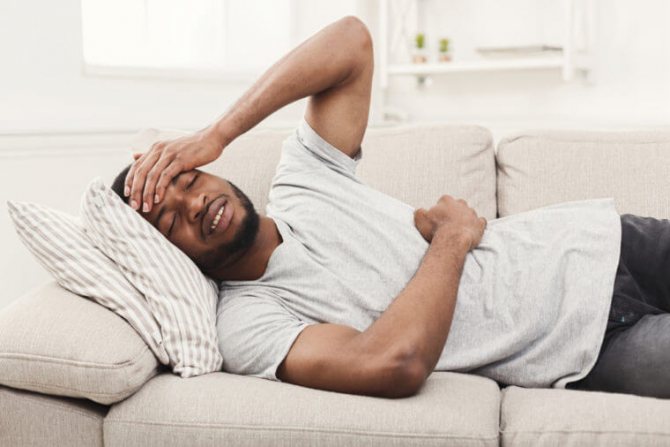
Exposure to excessively low temperatures or hypothermia of the feet can lead to a deterioration in health and the development of an inflammatory process.
There are several common pathologies of the urinary system. These include:
- Stone formation.
- Cystitis.
- Inflammatory process in the area of the kidneys and urethra.
- Malignant tumors of the urinary organs.
Inflammatory diseases
If an unpleasant feeling is observed, the causes may be serious pathologies. Therefore, you should not hesitate to visit the doctor. When unpleasant sensations appear over a long period of time, the cause is hidden in the inflammatory process.
A common problem is prostatitis
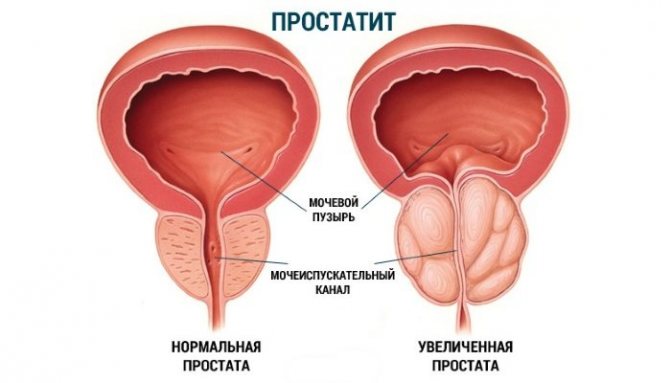
Prostatitis is considered one of the decisive factors in the manifestation of nagging pain in the lower abdomen. This disease refers to tissue damage in the prostate gland. The disease affects men aged 20 to 35 years. The main cause is considered to be impaired blood flow in the pelvic organs.
The main sign of the pathological process is a burning sensation in the lower abdomen in men. Additional symptoms appear :
- In painful pulling sensations in the abdomen, perineum and urethra.
- In raising temperature values.
- Head pain and dizziness.
- In chronic fatigue, weakness of the body, overwork.
During the acute period, the patient complains of severe pain. In the chronic course, the pain syndrome is aching and dull in nature.
In the absence of timely treatment, adverse consequences occur in the form of sexual dysfunction, infertility, and the formation of malignant tumors.
Cholecystitis and its symptoms
When there is pain in the right lower abdomen in men, cholecystitis is suspected. This pathology is characterized by tissue damage in the gallbladder. The cause of the disease is abuse of alcohol, fatty and fried foods.
The main signs of cholecystitis include:
- aching and dull pain in the right side;
- nausea and vomiting;
- temperature rise above 38 degrees;
- bloating and tachycardia.
In the absence of timely treatment, complications may develop in the form of perforation of the walls of the gallbladder, transition to a gangrenous or emphysematous form.
Cystitis: consequences
This disease is commonly understood as damage to the bladder. The cause of inflammation is the ingress of microbes in the form of staphylococci and E. coli.
The main symptoms appear:
- in changes and cloudiness of urine;
- the appearance of blood in urine;
- pain during urination;
- in discomfort in the perineal area.
Over a long period of time, the disease leads to uncontrolled urination. If cystitis becomes chronic, it cannot be completely cured.
Pyelonephritis
Why does the lower abdomen ache in men? Pyelonephritis is a common disease that occurs as a result of infection. It is an inflammatory process in the kidney area, often affecting men over the age of 60 who suffer from prostate adenoma.
The disease is accompanied by a feeling of nausea, bouts of vomiting, weakness, headache, loss of appetite and fever. The urine becomes cloudy, and the process of its excretion causes discomfort in the patient.
Reasons and what it could be
Burning and cramping in the lower abdomen can be harbingers of various diseases, the main ones include:
- Sexually transmitted diseases such as chlamydia, syphilis, gonorrhea. Their first symptoms often appear within 48 hours after infection. Sexually transmitted diseases are also characterized by skin rashes in the intimate area, problems with urination and pain during this process; patients often experience pain and discomfort during sexual intercourse with a woman. If you discover the above symptoms, you should consult a urologist. Venereal diseases require immediate professional treatment. Traditional methods are aimed only at reducing symptoms, but cannot rid the body of the true causes of the disease.
- Inflammation of the prostate gland occurs for various reasons, it can be a previous sexually transmitted disease, hypothermia, genetic predisposition, weak immune system, excessive stress, and so on. In this case, representatives of the stronger sex, in addition to burning and stinging, experience a lot of other unpleasant symptoms, for example: they experience a feeling of discomfort during sexual intercourse; they have problems with erection; Patients are characterized by a frequent urge to urinate, which is often accompanied by pain. Prostatitis most often occurs in mature men.
- Diseases associated with the reproductive system , such diseases, for example, include vesiculitis, which is an inflammation of the seminal vesicles. In this case, the production of seminal fluid is disrupted, and the man experiences severe pain in the lower abdomen, which intensifies during sexual intercourse. If left untreated, the disease can lead to the formation of an abscess of the seminal vesicle and further treatment with surgical intervention, including amputation. Orchitis is an inflammatory process in the testicles, in this case the pain radiates to the sacrum and lower back.
- Cystitis is an inflammation of the bladder. Men are much less susceptible to the disease than women. This is due to the peculiarities of the anatomical structure. The urethra of the stronger sex is much longer, so pathogenic microorganisms have problems getting into the bladder. The disease is also characterized by an increase in temperature, the color and smell of urine changes, and patients experience the urge to urinate every 20-30 minutes.
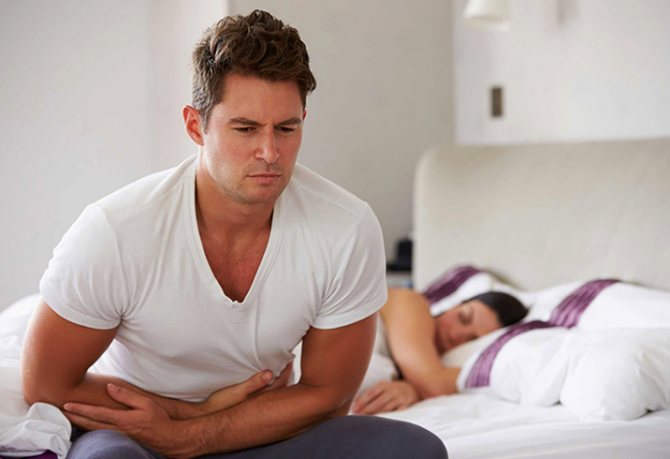
Reproductive system disorders
Pathologies of the genital organs are often an explanation for why the right side in the lower abdomen ache in men. Diseases affecting the prostate gland and penis can cause discomfort in this part of the abdominal cavity. Disorders of the reproductive system include:
- Acute inflammatory process in the prostate area. It is accompanied by discomfort when urinating, sharp pain in the lower abdomen, a feeling of nausea, high fever and inability to have sexual intercourse.
- Chronic type of prostate disease. The pathology causes unpleasant sensations of aching or pulling nature, which occur not only in the peritoneum, but also in the hypochondrium area.
- Inflammatory process in the testicles. The functioning of the gonads can be disrupted as a result of various infections (flu, mumps, gonorrhea). Pathology is also provoked by mechanical damage and exposure to excessively low temperatures. With this disease, the right side hurts or the left side in the lower abdomen ache.
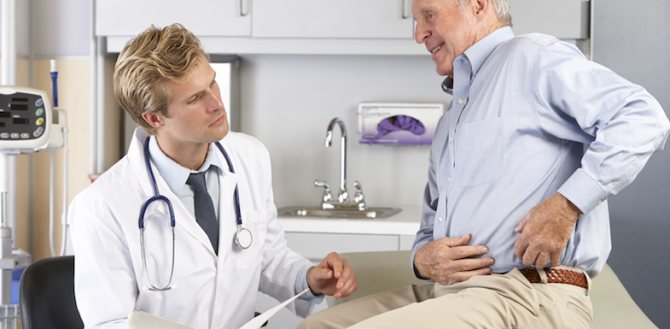
Why does the lower abdomen on the right hurt?
The nature of the pain can be varied. It is impossible to establish an accurate diagnosis. That is why patients are prescribed a comprehensive examination.
Prostatitis
This disease occurs against the background of inflammation of the prostate tissue. As a rule, the pain is nagging in nature. Usually in the early stages they are not intense. However, over time they intensify and become permanent.
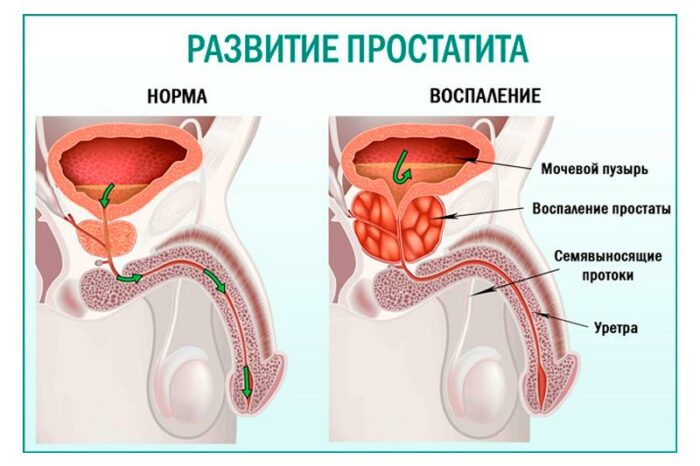
There are chronic and acute forms of prostatitis.
The main symptoms are impaired potency and urination.
Pathology occurs as a result of age-related changes, stagnation of blood in the organs of the reproductive system, and pelvic injuries. Treatment is carried out in accordance with the cause of prostatitis.
Appendicitis
The appendix is a small extension of the intestine. When it is inflamed, pain occurs in the lower abdomen and is localized on the right side. It is always acute and can be accompanied by nausea and vomiting. Intensifies when pressing on the right side. An increase in body temperature is also observed.
The patient requires urgent surgery. This is due to the fact that when the appendix ruptures, sepsis and peritonitis develop. Complications lead to death.
How to distinguish appendicitis from other diseases in the following video:
Gallbladder dysfunction
Pain on the right side of the lower abdomen may indicate gallbladder dysfunction. They radiate to the back, under the shoulder blade, to the right side, and are permanent.
Among the pathologies of the gallbladder are:
- Cholelithiasis. Characterized by the formation of solid inclusions in the gallbladder. The pain is paroxysmal in nature, radiating to the shoulder and right hypochondrium.
- Cholecystitis. Accompanied by disruption of the digestive process. This is due to the lack of a sufficient amount of bile entering the duodenum.
- Cholangitis. It occurs against the background of inflammation of the ducts of the organ, which occurs as a result of their blockage. The pain is cramping in nature and is localized in the right hypochondrium.
Diseases require careful diagnosis and immediate treatment.
Lack of therapy leads to serious complications.
To establish the exact cause, a comprehensive diagnosis is prescribed. Only after receiving and studying the results, the doctor prescribes the necessary course of treatment.
Nonspecific ulcerative colitis
Pain on the right side in men can also occur as a result of inflammation of the colon mucosa. In this case, ulcers begin to form on the surface of the organ, which is accompanied by severe symptoms.
The pain syndrome is paroxysmal in nature, accompanied by internal bleeding and indigestion.
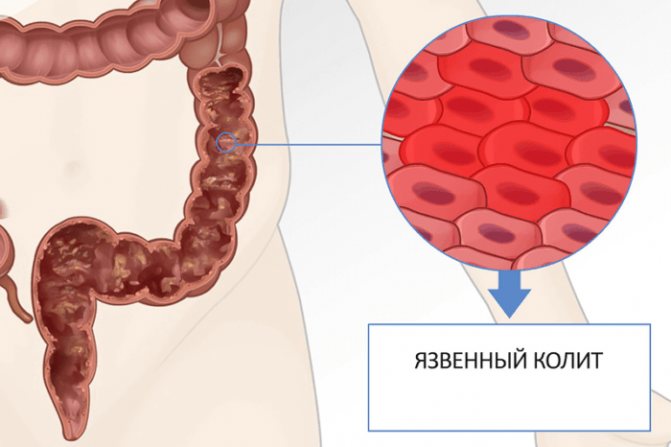
Localized in the area of intestinal damage, mainly on the right side. Experts have not yet fully established what is the true cause of the development of ulcerative colitis.
Diverticulosis
It manifests itself as the formation of a diverticulum on the walls of the colon. They are pockets. But pain manifests itself when the inflammatory process begins.
The causes of the disease are a sedentary lifestyle, obesity and excess weight, and poor nutrition.
Associated symptoms include bloating, a feeling of heaviness, stool disturbances and intestinal upset.
Treatment is carried out by adjusting the diet and changing lifestyle. It is important to completely stop smoking and drinking alcohol.
Nephrolithiasis
The disease occurs against the background of kidney damage, resulting in the formation of stones in the organs. The causes of development include poor nutrition, lack of fluid, sedentary lifestyle, and genetic predisposition.
In the early stages there may be no signs. But over time, nausea and vomiting appear. Blood impurities appear in the urine, and the pain is paroxysmal in nature and is localized in the lower abdomen on the right side, in the lumbar region and radiates to the groin.
Lack of therapy leads to severe renal failure.
Intestinal obstruction
Many men, when experiencing pain in the lower abdomen, are concerned about what it could be. One of the causes of this unpleasant symptom is intestinal obstruction.
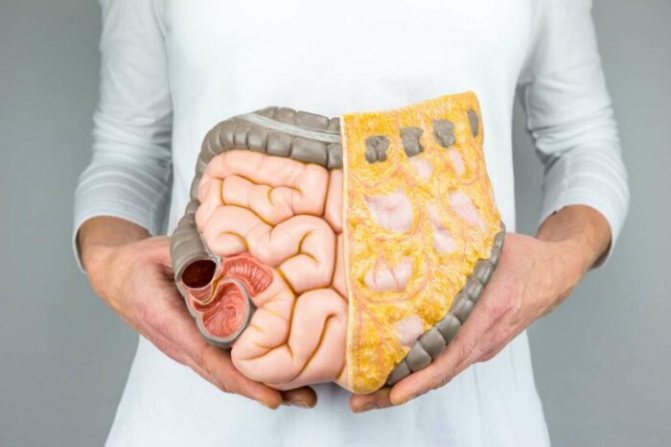
Pain occurs when the intestinal passage is partially or completely blocked. At the same time, it radiates to the right hypochondrium, accompanied by nausea and vomiting.
The causes of the disease are poor nutrition, the presence of tumors of various types, stones in the bladder, and adhesions.
Patients require immediate treatment, as ignoring symptoms is fatal.
Inguinal hernia
The pathology is one of the most common among male patients. An inguinal hernia begins to form mainly in adolescence.
A feature of the disease is a long asymptomatic period. But over time, pain occurs in the groin area and radiates to the testicle.
Treatment is carried out comprehensively. But wearing fixing bandages and special bandages for a hernia at an older age is not prescribed, as this does not give results.
Cancer
The most dangerous disease, which manifests itself in the form of pain on the right side of the lower abdomen, is colorectal cancer. It often begins to form from polyps. These are benign growths that arise as a result of uncontrolled division of epithelial cells.
Under the influence of unfavorable factors, they transform into cancer.
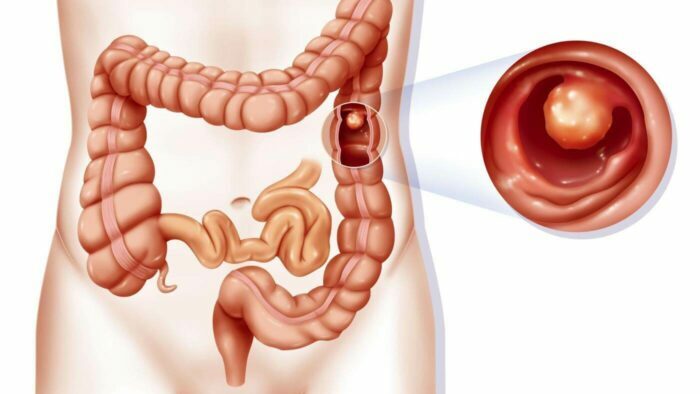
When polyps reach significant sizes, painful sensations occur. Over time, signs such as weakness, constant fatigue, impaired urination, and decreased potency appear.
But cancer in the early stages can occur without symptoms, especially if the tumor is small. The presence of a malignant tumor is also indicated by pain during bowel movements, bleeding from the anus, constipation, nausea, and vomiting.
Feces change color and contain mucus and blood clots. In the final stages, internal bleeding may occur.
Treatment is carried out depending on the stage of cancer pathology. Complex therapy is often used, including chemotherapy, radiation therapy and surgery.
Lack of treatment for a cancer tumor leads to the spread of metastatic lesions, disruption of the functioning of other organs and death.
Cancer is the most serious disease. That is why, when symptoms appear, it is important to promptly consult a doctor who will tell you what to do. Delay may result in a poor prognosis.
Disorders of the digestive system
Normal functioning of the gastrointestinal tract is necessary to maintain the health of any person. If the functions of the stomach or intestines are impaired, the individual experiences characteristic symptoms. Discomfort in the lower abdomen in men is often a consequence of the following pathologies:
- Crohn's disease.
- Inflammatory process in the appendix.
- Colitis.
- Intestinal obstruction.
- Hernia.
- Malignant neoplasms of the gastrointestinal tract.
- Chronic stool retention.
- Deformation of the colon.
Inflammatory process in the appendix
This disease is called appendicitis. With this disease, discomfort in the lower right abdomen in men is common.
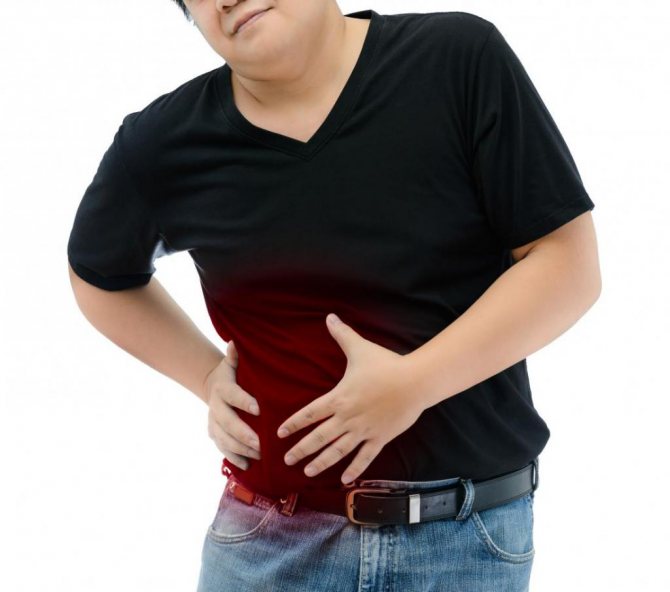
The vermiform appendix of the cecum can become inflamed under the influence of the following factors:
- The presence of gastrointestinal pathologies that are chronic.
- Prolonged stool retention.
- Infectious diseases (tuberculosis, typhoid).
- Mechanical damage to the peritoneum.
- Deformations of the appendix.
- Clogged appendix with sunflower seed peels and grape seeds.
The inflammatory process in this organ is accompanied by discomfort in the lower part of the peritoneum, attacks of nausea and vomiting, tension in the abdominal muscles, stool retention or diarrhea, and fever. This disease requires urgent medical attention.
Causes of pain
We can list the most typical causes of pain that occurs in men in the lower abdomen:
- Inflammatory processes of the gastrointestinal tract, peptic ulcer. The pain is aching if the disease is chronic and very acute, having the nature of contractions, during exacerbations.
- Inflammation of the appendix. The pain varies in nature, and does not necessarily appear on the right side. A characteristic symptom is acute pain, nausea, fever.
- Localization of pain in the left side of the lower abdomen indicates inflammation of the diverticulum if it is accompanied by nausea and low-grade fever.
- In addition to acute pain, a strangulated inguinal hernia causes vomiting and sometimes loss of consciousness. This condition requires urgent surgery.
- The inflammatory renal process - pyelonephritis, also provokes pain in the lower abdomen.
- A similar process in the testicles (orchitis) provokes pain in the groin.
In men, the oncological process rarely causes such pain, although pain appears at a late stage of tumor development.
Intestinal disorders
This is, first of all, obstruction. This condition is characterized by blockage of the organ with the contents of the gastrointestinal tract. It develops under the influence of the following factors:
- The presence of neoplasms or adhesions, stones, or foreign objects.
- A disorder of intestinal motor functions, which is explained by excessive consumption of food after prolonged hunger, eating high-calorie foods.
- Inflammatory processes in the appendix or pancreas.
- Taking painkillers or anesthetics.
The disease is accompanied by discomfort, attacks of vomiting, the inability to pass feces and gases, and an increase in the size of the peritoneum.
Aching pain in the lower abdomen in men is also a symptom of a neoplasm in the intestinal area. The tumor can be either malignant or benign. If it reaches large volumes, this condition is dangerous. The patient has a risk of rupture of the gastrointestinal tract and the development of an acute inflammatory process in the peritoneum. Aching pain in the left lower abdomen in men also often indicates the presence of pathology of the sigmoid colon or diverticulosis.
Unpleasant sensations during or after intimate contact
Sometimes representatives of the stronger sex notice that sex begins to cause them discomfort. How can such a phenomenon be explained?
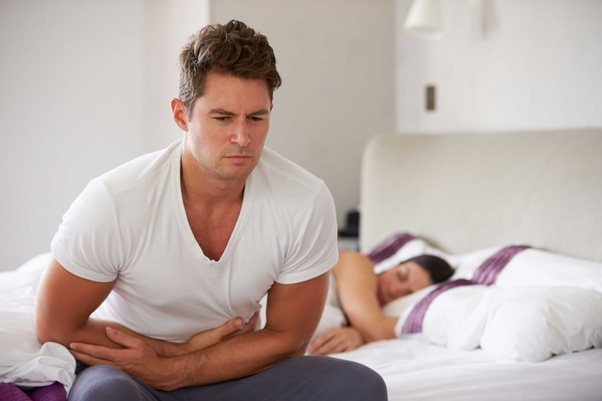
If there is pain in the left lower abdomen in men after intimate contact, the reason often lies in pathologies of the reproductive system. These include the inflammatory process in the prostate gland, a benign neoplasm in this organ. In some cases, the malaise is explained by infections that are transmitted during sex. These are diseases such as chlamydia and gonorrhea. Patients with similar diseases notice the discharge of pus or cloudy fluid from the urethra, rashes and sores on the surface of the penis. In addition, infections are accompanied by discomfort in the lower abdomen in men and a burning sensation. If a couple uses condoms or spermicides to protect against conception, symptoms may be due to individual intolerance to the ingredients contained in these products.
What should you suspect?
Pulling, cutting, sometimes quite intense pain in the lower abdomen in men, which is accompanied by urinary retention and erectile dysfunction, and also spreads to the groin, scrotum and inner thigh area, most likely indicates the development of prostatitis.
An inflammatory process in the prostate gland occurs in every second patient after the age of 50, which is associated with the structural features of the male genital area.
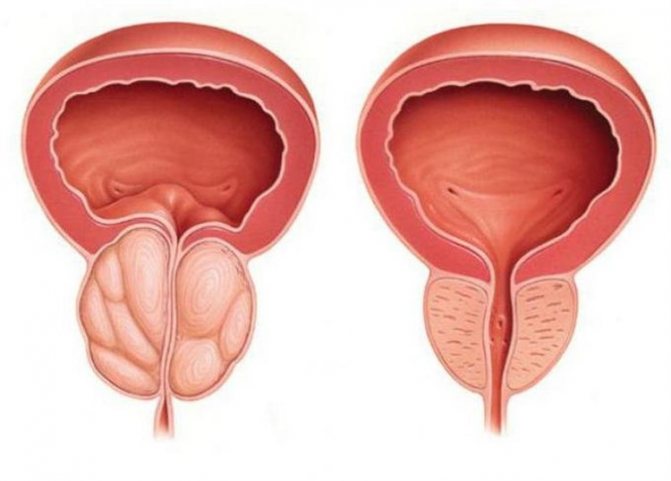
Healthy prostate (left) and prostatitis (right)
Left without medical attention, acute prostatitis very quickly transforms into a chronic form of the disease.
An inflammatory process with a chronic course, despite its lethargy and relative secrecy of pathological symptoms, leads to the proliferation of gland tissue and the formation of adenoma - a benign prostate tumor. The adenoma increases in size over time, puts pressure on nearby organs, causes male impotence and serious problems with urination.
Prostatitis in men is one of the most common diseases leading to infertility and cancerous degeneration of the prostate gland.
Ways to provide assistance
How to understand that pain is associated with an emergency condition? This can be judged by the presence of the following signs:
- Acute discomfort that lasts more than 60 minutes and is accompanied by tension in the abdominal muscles.
- Increased discomfort when moving, coughing.
- Disruption of the process of excretion of feces and gastric contents.
- Presence of blood in the stool.
- Pale coloration of the skin, profuse cold sweat, increased heart rate.
- Decrease in blood pressure readings.
- Nausea and repeated bouts of vomiting.
- Severe discomfort in the left lower abdomen in men, which is accompanied by difficulty in urinating or urine retention.
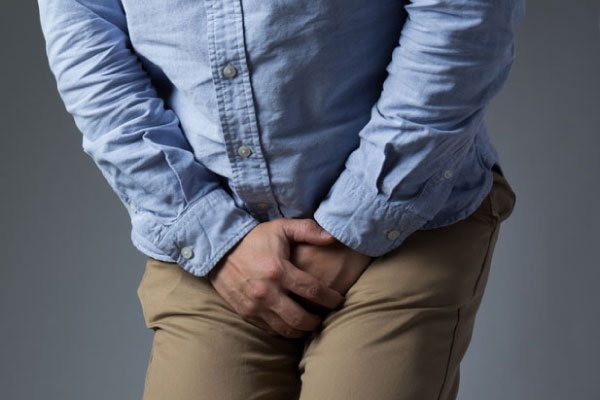
- Violation of the breathing process.
- Loss of consciousness.
In such situations, it is necessary to call an ambulance service. The patient should take a lying position, place a lotion or a heating pad with cold water on the peritoneal area for about 30 minutes. The patient should not be given medications until medical workers arrive. Consumption of food and liquid is also undesirable. If you are very thirsty, you can lightly moisten the lip area.
Medical events
After the patient contacts a medical institution, he is prescribed diagnostic procedures. These include laboratory tests of biological material (urine, blood, taking a smear from the urethra), as well as other methods of assessing the condition (ultrasound of the reproductive system, abdominal organs, FGDS, colonoscopy, x-rays). Treatment methods depend on the results of the examinations. They may involve taking medications. These are, for example, drugs to combat harmful microorganisms (“Cefaclor”, “Cefuroxime”, “Amoxiclav”), drugs to eliminate spasms (“No-shpa”, “Papaverine”), tablets that relieve inflammation (“Ibuprofen”, “ Nimesulide"). With the development of acute pathologies (appendicitis, torsion of the gonad), the patient requires surgical intervention. In case of problems with the reproductive system, physiotherapy is often used. A proper diet is of no small importance for a number of diseases. For example, if stones form in the urinary organs, it is necessary to limit the consumption of salt, smoked foods, baked goods, and drinks containing ethanol and caffeine. Bran, fruits, dairy products (kefir, cottage cheese) are recommended.

Patients with intestinal pathologies should avoid confectionery, chocolate, hot sauces and seasonings, fatty foods, and fried foods. Dishes made from lean meat or fish (meatballs, soufflés, cutlets), fruits and vegetables, pureed, steamed or baked in the oven, and cereals with a soft, slimy structure (for example, oatmeal) are allowed. A proper diet and medication improve the functioning of the gastrointestinal tract and the general condition of the patient.



